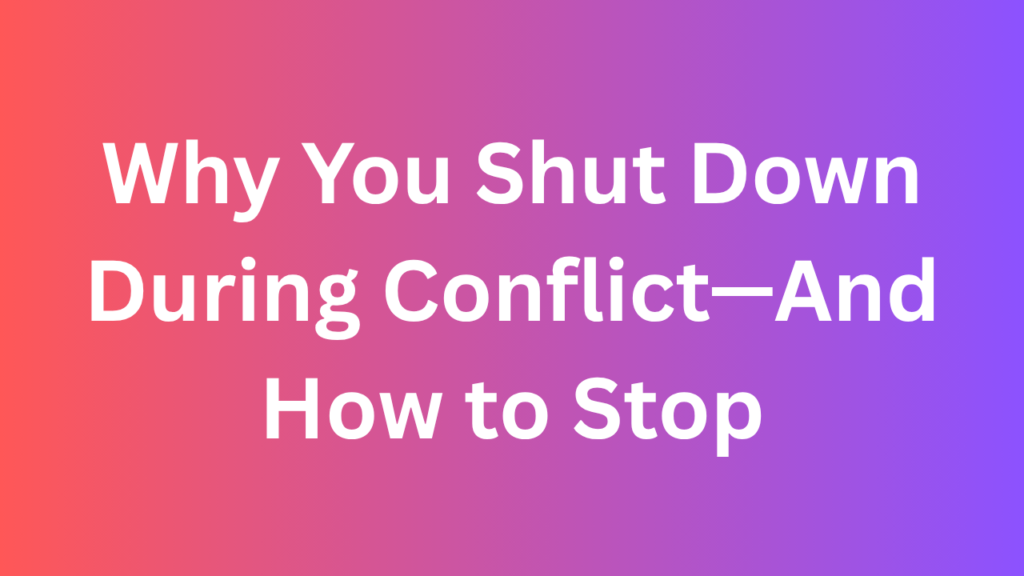Conflict is a normal part of any relationship. But while some people get loud, others go quiet. If you’re the type to shut down during conflict, you’re not alone. Maybe your heart races, your mind goes blank, or you just freeze. Instead of speaking your truth, you retreat inward—and later, you might regret the things you didn’t say.
So, why does this happen? And more importantly, how can you stop shutting down and start showing up—even when things get heated?
Let’s break it down with compassion and clarity.
What Does It Mean to “Shut Down” During Conflict?
Shutting down can look like:
- Going completely silent
- Withdrawing emotionally or physically
- Avoiding eye contact
- Feeling numb or disconnected
- Saying “I’m fine” when you’re clearly not
On the outside, it may seem like you’re calm—but inside, you’re overwhelmed. This is often your brain’s way of protecting you from perceived emotional danger.
Why You Shut Down: The Psychology Behind It
1. Fight, Flight, Freeze… or Fawn
When faced with conflict, your nervous system activates a survival response. Most people are familiar with fight or flight, but freezing is just as common. Shutting down is your body’s way of freezing to avoid danger—especially if you grew up in an environment where speaking up was unsafe.
2. Past Trauma or Negative Experiences
If you’ve had past relationships where conflict led to rejection, abuse, or humiliation, your brain remembers. You may unconsciously avoid speaking during arguments because your body has learned: “Silence is safer.”
3. Fear of Rejection or Abandonment
Some people shut down because they fear the conflict will drive the other person away. They’d rather stay quiet than risk losing the relationship.
4. Struggles with Emotional Expression
Not everyone was taught how to process or express emotions. If you weren’t shown healthy ways to navigate conflict growing up, it’s normal to default to silence.
Why It’s a Problem
While shutting down might protect you in the moment, over time it leads to:
- Miscommunication
- Emotional distance in relationships
- Bottled-up resentment
- Lack of resolution to recurring problems
- Feeling misunderstood, unheard, or even invisible
Your silence may be misinterpreted as disinterest, stubbornness, or emotional detachment—even when it’s really about feeling overwhelmed or unsafe.
How to Stop Shutting Down During Conflict
You don’t have to change overnight. This is a process—and it starts with awareness.
1. Recognize Your Triggers
What types of conflict make you shut down? Is it a raised voice? A specific topic? A certain tone?
✨ Journal Prompt: “I tend to shut down when…”
Naming your trigger is the first step to regaining power over it.
2. Check in with Your Body
Before you go silent, your body will often give you clues: a racing heart, tight chest, shallow breath, or clenched fists. These are signs you’re heading into freeze mode.
What to do:
- Pause.
- Take a few deep belly breaths.
- Remind yourself: “I am safe. I can express myself calmly.”
3. Communicate That You’re Struggling (In the Moment)
If you can’t speak your full truth during the heat of the moment, at least say something like:
- “I’m feeling overwhelmed. Can we take a short break and talk in 10 minutes?”
- “I need a moment to gather my thoughts, but I want to talk about this.”
- “I’m not shutting you out. I just need a little time to process this.”
This helps your partner or friend know you’re not stonewalling them—you’re just trying to stay emotionally regulated.
4. Practice Expressing Difficult Emotions Outside of Conflict
Strengthen your emotional muscles by naming your feelings in calm moments. Try:
- “I feel anxious when I think I might disappoint you.”
- “It’s hard for me to talk about this because I’m scared you’ll be upset.”
The more you do this, the more natural it becomes to speak up—even during tense moments.
5. Create Ground Rules for Healthy Conflict
If you’re in a romantic or close relationship, talk when you’re not fighting about how you each handle conflict.
Set agreements like:
- No yelling or name-calling
- Taking breaks if either person feels overwhelmed
- Returning to the conversation with a calm tone
When you know conflict won’t escalate into emotional danger, it’s easier to stay engaged.
6. Seek Therapy or Coaching (If Needed)
If shutting down is a deep-rooted pattern from trauma or childhood, it may take more than self-help tools to heal. A therapist can help you explore the root causes and practice new responses in a safe space.
There’s no shame in getting support. In fact, it’s a powerful act of self-love.
Final Thoughts: You’re Not Broken—You’re Protecting Yourself
If you shut down during conflict, it doesn’t mean you’re cold, immature, or incapable of communication. It means you’ve learned—maybe without even realizing it—that silence is safety.
But here’s the good news: you can unlearn it.
By getting curious instead of critical about your patterns, you can begin to shift. Conflict doesn’t have to mean fear. It can be a doorway to deeper understanding, healing, and connection.
Start small. Be kind to yourself. Speak up one sentence at a time.
You deserve to be heard. You’re worth the effort.
Have you ever shut down during an argument? What helped you cope or grow?
Share your story or tips in the comments. You never know who you might inspire.



